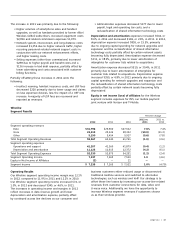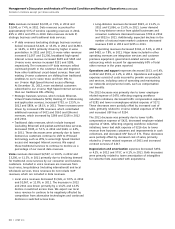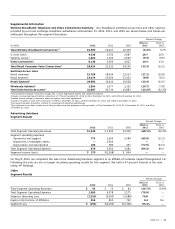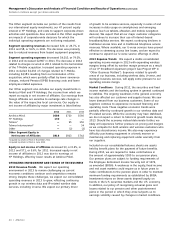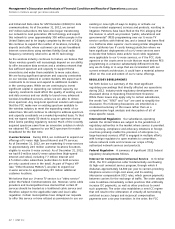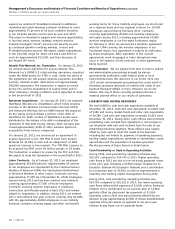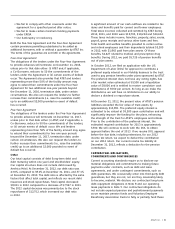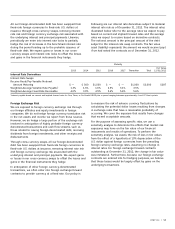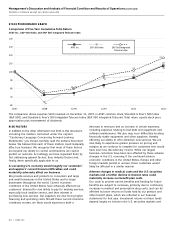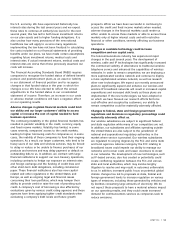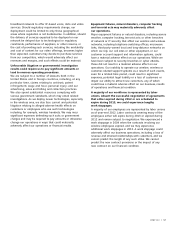AT&T Wireless 2012 Annual Report Download - page 49
Download and view the complete annual report
Please find page 49 of the 2012 AT&T Wireless annual report below. You can navigate through the pages in the report by either clicking on the pages listed below, or by using the keyword search tool below to find specific information within the annual report.
AT&T Inc. | 47
Fees on certain services not subject to such fees, including
Internet access service provided over wireless handsets
commonly called “smartphones” and wireless data cards, as
well as collecting certain other state and local fees. Plaintiffs
define the class as all persons who from April 1, 2003, until
the present had a contractual relationship with us for
Internet access through a smartphone or a wireless data
card. Plaintiffs seek an unspecified amount of damages as
well as injunctive relief. In October 2012, the Circuit Court in
St. Louis, Missouri, to which the case had been transferred,
granted preliminary approval to a settlement in which we
receive a complete release of claims from members of the
settlement class. Under the settlement, our liability to the
class and its counsel is capped at approximately $150, the
amount that was collected from customers but not owed or
remitted to the government. The court has scheduled a final
fairness hearing in February 2013, at which time the Court
will consider, among other things, whether the settlement
should be finally approved.
Wage and Hour Litigation Two wage and hour cases were
filed in federal court in December 2009 each asserting claims
under the Fair Labor Standards Act (Luque et al. v. AT&T Corp.
et al., U.S. District Court in the Northern District of California)
(Lawson et al. v. BellSouth Telecommunications, Inc., U.S.
District Court in the Northern District of Georgia). Luque also
alleges violations of a California wage and hour law, which
varies from the federal law. In each case, plaintiffs allege that
certain groups of wireline supervisory managers were entitled
to paid overtime and seek class action status as well as
damages, attorneys’ fees and/or penalties. Plaintiffs have been
granted conditional collective action status for their federal
claims and also are expected to seek class action status for
their state law claims. We have contested the collective and
class action treatment of the claims, the merits of the claims
and the method of calculating damages for the claims. A jury
verdict was entered in favor of the Company in October 2011
in the U.S. District Court in Connecticut on similar FLSA claims.
In April 2012, we settled these cases, subject to court
approval, on terms that will not have a material effect on
our financial statements. In October 2012, the court granted
preliminary approval of the settlement in Luque, and the final
approval hearing is scheduled for April 5, 2013. The parties
anticipate filing the Motion for Preliminary Approval in
Lawson in the first quarter of 2013.
Project VIP In November 2012, we announced plans to
significantly expand and enhance our wireless and wireline
broadband networks to support future IP data growth and
new services. As part of Project Velocity IP (VIP), we plan
to expand our deployment of LTE wireless technology and
deploy additional technology to further improve wireless
spectrum efficiencies. To that end, we expect to cover at
least 250 million people in the United States by year-end
2013 and approximately 300 million people in the
United States by the end of 2014. In addition, we plan to
NSA Litigation Twenty-four lawsuits were filed alleging that
we and other telecommunications carriers unlawfully
provided assistance to the National Security Agency in
connection with intelligence activities that were initiated
following the events of September 11, 2001. In the first filed
case, Hepting et al v. AT&T Corp., AT&T Inc. and Does 1-20,
a purported class action filed in U.S. District Court in the
Northern District of California, plaintiffs alleged that the
defendants disclosed and are currently disclosing to the
U.S. Government content and call records concerning
communications to which Plaintiffs were a party. Plaintiffs
sought damages, a declaratory judgment and injunctive relief
for violations of the First and Fourth Amendments to the
U.S. Constitution, the Foreign Intelligence Surveillance Act
(FISA), the Electronic Communications Privacy Act and other
federal and California statutes. We and the United States
filed motions to dismiss the complaint. The court denied
the motions, and we and the United States appealed.
In August 2008, the U.S. Court of Appeals for the
Ninth Circuit remanded the case to the district court
without deciding the issue in light of the passage of the
FISA Amendments Act, a provision of which addresses the
allegations in these pending lawsuits (immunity provision).
The immunity provision requires the pending lawsuits to
be dismissed if the Attorney General certifies to the court
either that the alleged assistance was undertaken by
court order, certification, directive or written request or
that the telecom entity did not provide the alleged
assistance. In September 2008, the Attorney General filed
his certification and asked the district court to dismiss all of
the lawsuits pending against the AT&T Inc. telecommunications
companies. The court granted the Government’s motion to
dismiss and entered final judgments in July 2009. In addition,
a lawsuit seeking to enjoin the immunity provision’s application
on grounds that it is unconstitutional was filed. In March 2009,
we and the Government filed motions to dismiss this lawsuit.
The court granted the motion to dismiss and entered final
judgment in July 2009. All cases brought against the AT&T
entities have been dismissed. In August 2009, plaintiffs in all
cases filed an appeal with the Ninth Circuit Court of Appeals.
In December 2011, the Ninth Circuit Court of Appeals affirmed
the dismissals in all cases. In March 2012, the Plaintiffs in all
but three cases filed a petition for writ of certiorari with the
U.S. Supreme Court. The plaintiffs in two of the three cases filed
petitions for rehearing with the Ninth Circuit Court of Appeals,
both of which were denied. The plaintiffs in the third case did
not file a petition in either court. In October 2012, the U.S.
Supreme Court denied the remaining plaintiffs’ petition, thereby
ending the litigation.
Universal Service Fees Litigation In October 2010, our
wireless subsidiary was served with a purported class action
in Circuit Court, Cole County, Missouri (MBA Surety Agency,
Inc. v. AT&T Mobility, LLC), in which the plaintiffs contend that
we violated the FCC’s rules by collecting Universal Service


